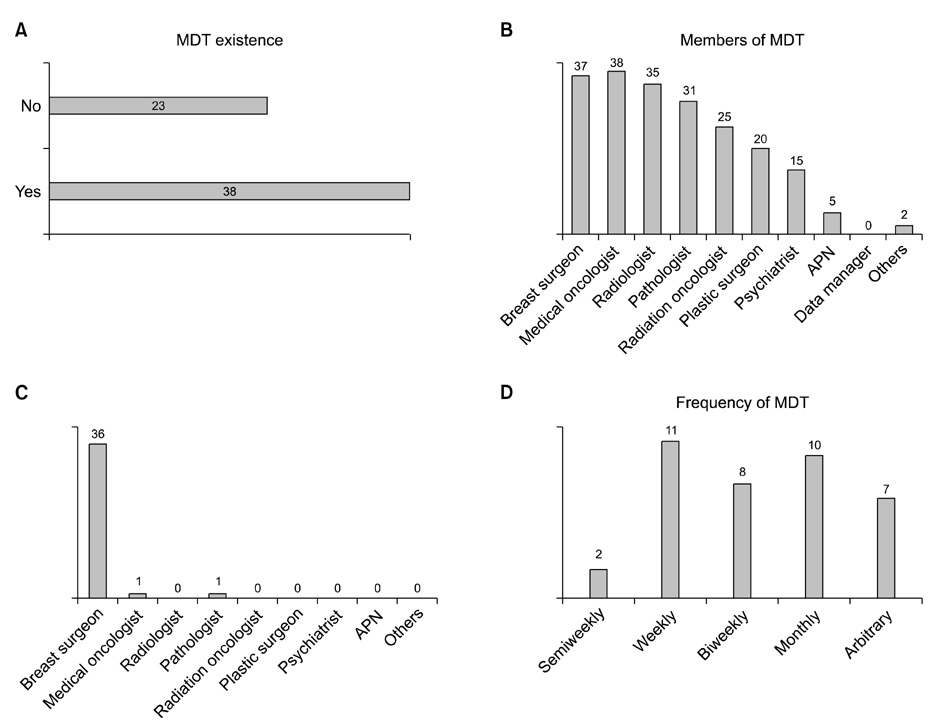J Korean Surg Soc.
2012 Jun;82(6):340-346.
Multidisciplinary team approach in breast cancer: a nationwide survey in Korea
- Affiliations
-
- 1Department of Surgery, Seoul St. Mary's Hospital, The Catholic University of Korea, Seoul, Korea. bjsong@catholic.ac.kr
Abstract
- PURPOSE
This assesses the current workings of multidisciplinary team (MDT) meetings across Korea through surgeons' reports and their current commitments to MDT meetings pertaining to breast cancer, and to determine any perceived areas of potential improvement.
METHODS
A questionnaire was sent out to 307 members of The Korean Breast Cancer Society (KBCS) who worked at comprehensive or university medical centers in Korea. The mailing lists of the KBCS members were obtained with the approval of the society. From December 2008 to February 2009, the survey was distributed by surface and electronic mail, with an initial mailing followed by another distribution to non-responders eight weeks later.
RESULTS
Sixty-five individuals (21.2%) returned the completed survey. Of these, 38 responders (62.3%) participated in MDT meetings. Most (97.4%) breast health specialists regarded MDT meetings as an effective method for treatment planning. Most responders (94.7%) reported that the MDT leader was a breast surgeon.
CONCLUSION
The MDT approach is perceived as an effective method for breast cancer treatment planning and is a feature in most major centers in Korea. Further work is needed to ensure that the MDT approach operates as intended and that all breast cancer patients have access to an MDT.
Keyword
MeSH Terms
Figure
Reference
-
1. Gillis CR, Hole DJ. Survival outcome of care by specialist surgeons in breast cancer: a study of 3786 patients in the west of Scotland. BMJ. 1996. 312:145–148.2. Association of Breast Surgery @ BASO, Royal College of Surgeons of England. Guidelines for the management of symptomatic breast disease. Eur J Surg Oncol. 2005. 31:Suppl 1. 1–21.3. Harrison JD, Choy ET, Spillane A, Butow P, Young JM, Evans A. Australian breast cancer specialists' involvement in multidisciplinary treatment planning meetings. Breast. 2008. 17:335–340.4. Fleissig A, Jenkins V, Catt S, Fallowfield L. Multidisciplinary teams in cancer care: are they effective in the UK? Lancet Oncol. 2006. 7:935–943.5. Houssami N, Sainsbury R. Breast cancer: multidisciplinary care and clinical outcomes. Eur J Cancer. 2006. 42:2480–2491.6. Whelan JM, Griffith CD, Archer T. Breast cancer multi-disciplinary teams in England: much achieved but still more to be done. Breast. 2006. 15:119–122.7. Macaskill EJ, Thrush S, Walker EM, Dixon JM. Surgeons' views on multi-disciplinary breast meetings. Eur J Cancer. 2006. 42:905–908.8. Girgis A, Boyes A, Sanson-Fisher RW, Burrows S. Perceived needs of women diagnosed with breast cancer: rural versus urban location. Aust N Z J Public Health. 2000. 24:166–173.9. Sanson-Fisher R, Girgis A, Boyes A, Bonevski B, Burton L, Cook P. Supportive Care Review Group. The unmet supportive care needs of patients with cancer. Cancer. 2000. 88:226–237.10. Brennan M, Spillane A. The evolving role of the breast physician in the multidisciplinary breast team. ANZ J Surg. 2007. 77:846–849.
- Full Text Links
- Actions
-
Cited
- CITED
-
- Close
- Share
- Similar articles
-
- Requirements to improve multidisciplinary cancer care
- Review on history and current practices of cancer multidisciplinary care
- Personalized Treatment of Head and Neck Cancers and the Role of Head and Neck Surgeons
- Multidisciplinary approach for hepatocellular carcinoma patients: current evidence and future perspectives
- Multidisciplinary team approach in cancer care



